- Home
- Rebecca Hagan Lee
Gossamer Page 5
Gossamer Read online
Page 5
“PAPA!” THE UPSTAIRS nursery vibrated with the high-pitched squeals of excited little girls. Three-and-a-half-year-old Ruby scrambled out from beneath the covers of her bed, climbed over the guardrails, and launched herself at her father, wrapping her arms around his knees. “What chou brwing me, Papa?”
James handed the baby over to Mrs. Glenross before reaching down to lift Ruby into his arms. Two-year-old Garnet bounced up and down on the mattress before she followed Ruby’s example, lifting her short chubby leg to pull herself over the bed rail.
Ruby’s silky cap of jet black, chin-length hair swung to and fro as James lifted her above his head before settling her into his arms. “I brought myself,” he whispered into her ear as he stole little kisses from the ticklish spot on the side of her neck.
Ruby giggled with glee, then leaned back in the safety of her father’s strong arms, wrinkled her brow, and asked in all seriousness, “What else chou brwing me?”
“I brought you the sun and the moon and the stars, happy thoughts, and sweet dreams,” he answered.
Ruby wrinkled her brow even harder. “What else?”
James laughed. “Ah, Ruby, my love, you’ve an avaricious nature.”
Ruby didn’t understand big words. She only understood that her papa hadn’t told her what he’d brought her from his trip to Sanfrwansco and she had been patient long enough. She began to wiggle, throwing her slight weight against James’s arms. “What chou brwing me, Papa?” she demanded again.
James kissed her again, then set her on her feet. “I brought you a wondrous toy piano all your own,” he announced.
Helen Glenross groaned aloud.
Ruby squealed in delight and danced an impromptu jig about the room, bumping into Garnet, who had finally managed to climb out of bed and to toddle over to stand between Mrs. G. and her father. “Where it is, Papa?”
“Where is it,” he corrected automatically, reaching down to lift shy little Garnet from behind Mrs. G.’s skirts and into his arms. “It’s still packed in my bags.” James winked at his housekeeper. “I’m hoping that having a toy piano of her own will keep the little imp from playing the one in the parlor.”
Ruby crossed her arms over her chest and stared up at her father. “Want it.”
“Not tonight,” he said firmly.
Ruby stuck out her bottom lip, screwed up her face, and did her best to squeeze out a few tears to sway him before she made up her mind whether or not to wail.
James shook his head at her. “You may have your toy piano tomorrow morning,” he told her. “After breakfast.” He turned his attention to Garnet, who looped her arms around his neck and pressed her little face against his cheek in a ferocious hug. “Hello, sweet Garnet. Papa missed you, too.”
“What chou brwing Garny?” Ruby tried another tack as she marched over to James and tugged on his trousers.
“I brought Garnet the same things I brought you.”
“A pinano all her own, too?” Ruby was indignant.
“No,” James assured the firstborn and self-appointed ruler of the nursery roost. “I brought Garnet the sun and the moon and the stars, happy thoughts, and sweet dreams. And”—he gave dramatic pause—“a box of story blocks all her own.”
Garnet’s dark eyes widened in surprise and her tiny face seemed to light up from within at James’s announcement. She tightened her arms around his neck and pressed herself even closer to him.
James breathed in Garnet’s soap and talcum-powder scent and pondered the differences in his daughters’ personalities. Where Ruby was forthright, stubborn, and spoiled, Garnet was reticent, amiable, and generous. Though their looks were similar, there were obvious physical differences. Ruby was small but solidly built, a hardy energetic little girl with a broad, expressive face. Garnet was delicately formed with a smaller oval face and exquisitely formed features. She wasn’t a sickly child, only a quiet, retiring one, willing to follow rather than blaze a trail of her own. And where Ruby tended to be imperious and dictatorial toward her younger sisters, Garnet never seemed to take offense. She worshipped Ruby and adored her younger sister, Emerald, delighting in their company and in everything around her. James’s heart seemed to turn over in his chest every time she looked at him with love and trust and adoration brimming from her dark soulful eyes.
“Did chou brwing me brwocks, too?” Ruby demanded.
“No,” James patiently explained. “I brought you a wondrous toy piano.”
“Want brwocks,” Ruby insisted, stamping her little foot for emphasis.
“Would you rather have the blocks than the piano?” James asked.
Ruby shook her head. “Want brwocks and pinano.”
“I brought the blocks for Garnet,” James told his eldest child. “I brought a piano for you.” He glanced across the room to where thirteen-month-old Emerald was sitting in her crib. “And a bright red rubber ball for Emerald.”
Garnet reached up, placed her small palms on either side of James’s face, and turned his head toward Mrs. G. “What ’bout dat?” she asked softly, nodding toward the infant in Mrs. G.’s arms.
James hugged the little girl in his arms even tighter. Trust Garnet to be the first to notice Diamond and to notice that he had omitted the baby from his gift list. “That,” James explained, “is your new little sister, Diamond.”
Garnet smiled.
Arms akimbo, Ruby stamped her foot. “Wanna see.”
James bent at the waist and carefully set Garnet on her feet before taking Diamond from Mrs. G.’s arms. He carried the baby over to the rocking chair beside Emerald’s crib and sat down, angling his body so that Emerald could peer through the slats of her crib at the baby and the curious introductions. He made himself comfortable on the rocker, then leaned forward a bit and called Ruby and Garnet forward. “Come on over. Gently now,” he cautioned when Ruby made a beeline for his lap. “Come see Diamond.”
Ruby and Garnet wiggled closer, pressing their little bodies close against James’s legs. Garnet’s little face glowed with delight as James peeled back the blanket and held Diamond up so the girls could get a look at her face. She reached out and reverently touched the blanket. “Pwretty.” Garnet stood on tiptoe, making smacking sounds with her lips, as she leaned forward to kiss the baby.
James nodded his approval at Garnet and smiled at Emerald, who was reaching through the slats of her crib and babbling excitedly. James brushed his lips against Emerald’s hand, then turned1 to Ruby and asked, “What about you, sweetheart? What do you think of your new sister?”
Ruby frowned at the baby, displeasure written in big bold letters across her face for all the world to see. She backed up a step or two, away from the baby. “Rwuby rwather have her pinano,” she said, looking her daddy squarely in the eye. “And brwocks!”
Five
ELIZABETH WATCHED AS Father Paul strolled up and down the narrow path between the rows of graves. She focused her gaze on his feet, watching as the hem of his garment swept back and forth, brushing the tops of his black boots and across the sandy loam covering the newest sites in the ever-increasing potter’s field.
“Are you certain this is it?” Elizabeth asked, pointing to the second grave in the row.
Father Paul shrugged his shoulders, “I cannot be certain.” He stared down at the row of burial plots. “There are so many new ones.”
“Please, Father, try to remember,” she pleaded. “Owen had a boyish face, blond hair, and blue eyes. He was only twenty-one.”
“So young,” the priest remarked, reaching up to reposition his zucchetto on his close-cropped, grizzled hair. “They all seem so young to me.” Sighing heavily, he turned his attention back to the row of graves. “Perhaps, it is that one,” he told her, pointing to the second grave. “Or perhaps, that one, or the other,” he concluded, pointing to the first and third graves. “One of these three, although I cannot say exactly which one.”
Elizabeth stood quietly for a moment, absentmindedly chewing on her bottom lip,
before making a decision. “That’s the one.” She pointed to the second grave, then looked over at the elderly priest for confirmation. “Somehow, I just know Owen is buried there. I feel it in my heart.”
Father Paul nodded, his faded blue eyes brimming with understanding. “Then that grave is where his mortal body lies.”
“Fine, then,” Elizabeth agreed. “It’s settled.” She reached out and grasped the old man’s hand. “Thank you, Father.” Her next course of action determined, Elizabeth started out of the cemetery. “I’ll go order a headstone. A fine one of polished marble.” She turned back to the priest.
“See Mr. Dorminey at Dorminey Stone Works near the end of Larkin Street,” he instructed. “He’s one of my parishioners. Tell him I sent you.”
“Oh, thank you, Father. Thank you so much.” Elizabeth’s gratitude was mirrored in her blue-green eyes.
The elderly priest smiled. “Go with God, my child.”
TWO HOURS LATER, after having ordered and paid for a white polished marble headstone engraved with Owen’s name and dates, Elizabeth concluded her business with the owner of Dorminey Stone Works. Her sense of euphoria at having accomplished the tasks she had set for herself—that of locating Owen’s final resting place and purchasing a fine headstone to mark it—faded rapidly once Elizabeth left the stone works and realized she’d spent all but a small portion of her remaining cash on the first payment on the monument and the final payment would be due when the headstone was delivered.
She had planned to secure lodging in another establishment like the Russ House until she decided whether to stay in San Francisco and look for a suitable job or to move on, but staying in a hotel like the Russ House was out of the question now that she had so little money left. And traveling to another town was also out of the question until she replenished her cash. Elizabeth toyed briefly with the foolish notion of telegraphing her grandmother and asking her to send money, but discarded the idea almost as quickly as she’d thought of it. Her grandmother Sadler wouldn’t send money for Owen’s headstone or for Elizabeth to live on, nor would she acknowledge any plea for help—by letter or by telegram. Elizabeth had created a scandal and Grandmother Sadler had scratched her name out of the Sadler family Bible. She was as dead to their grandmother as Owen was. Grandmother had made that perfectly clear when she disowned her and asked her to leave, not only the Sadler family home on Hemlock Street, but Providence as well.
Elizabeth took a deep breath and willed herself to forget the hurtful things Grandmother had said about her—the names she had called her. What was done was done. She wouldn’t crawl back to Providence on her hands and knees to beg Grandmother’s forgiveness and she wouldn’t send a letter or telegram begging for money, either. She was on her own. And the next order of business was to find an inexpensive place to live and a job.
Her decisions made, Elizabeth took another deep breath and began the long journey back the way she had come—from Larkin Street back toward Saint Mary’s Square—in search of inexpensive lodging.
She found exactly what she was looking for on Clay Street, several blocks away from Saint Mary’s Church and the cemetery, in a place called Bender’s Boardinghouse. The owner of the establishment, Augusta Bender, was a stout, no-nonsense widow in her late fifties, who had sailed around the Horn to San Francisco in forty-nine. Although Mrs. Bender’s language was coarse and she wasn’t as clean as Elizabeth hoped she would be, she had rooms available and she didn’t require references for unchaperoned ladies.
“You can bring gentlemen friends back to your room at night if that’s your leanin’,” she said as she explained the house rules to Elizabeth.
“Oh, no, I’d never …” Elizabeth began.
But Mrs. Bender held up a hand to forestall Elizabeth’s assurances. “That’s what they all say. You don’t have to worry about explainin’ things to me. I know that a girl’s gotta make a livin’ however she can. But I’ll expect an extra two bits a night when your gentlemen friends stay over to cover the cost of the racket and of washing the sheets. And if a cop pinches you for solicitin’, I’m telling you now to leave my name and my establishment out of it. The rooms rent for a dollar-fifty a week with no meals. For seventy-five cents a week extra, I’ll guarantee you one meal a day. Take it or leave it.”
“I’ll take it,” Elizabeth told her.
Augusta Bender stared at her for a long minute before asking, “You sure you want to live here?”
Elizabeth nodded. “I’m sure.” She extended a hand to Mrs. Bender to conclude the agreement, then dug into her purse and counted out the required coins. “Here’s my first week’s rent in advance. One dollar and fifty cents for the room, plus seventy-five cents for meals for a total of two dollars and twenty-five cents.” She beamed at the older woman. “When may I move in?”
“Whenever you want,” Mrs. Bender replied. “I’ll get you some linens for the bed. And a pitcher of fresh water. The slipper tub’s in the room at the end of hall. Full baths are assigned by room number. You’re in room four, so your bath time is four in the afternoon. You have the tub room all to yourself for one hour. If you miss your time or need to change your hour, you’ll have to negotiate with one of the other residents. And I’m not a lady’s maid. I don’t fetch hot water or empty the tub, but the kitchen has an indoor pump and I keep the reservoir in the stove full of hot water. You’re responsible for emptying the tub when you finish with it. Just tip it over. The water’ll run down a pipe and out into the street.” She reached into her apron pocket, pulled out a key, and gave it to Elizabeth. “Supper’s at six-thirty. Welcome to Bender’s.”
It took three trips by foot, and the remainder of the afternoon to transfer her baggage from the San Francisco Ferry Building at the end of Market to the boardinghouse on Clay. Elizabeth was exhausted by the time she carried the last of her valises up the stairs to her second-floor room at Bender’s. Elizabeth surveyed the sparsely furnished room with its dingy walls, rough planked floors, marble-topped washstand, and cheap furniture, then dropped her bags on the floor beside the narrow wooden bed and walked over to the window. After struggling with the stubborn window, she managed to raise it a couple of inches to allow the fresh air to dispel the musty odor. After removing the stack of clean bed linen and a quilt from its resting place atop the scratched and scarred mahogany bureau, Elizabeth made up the bed.
The aroma of food cooking in the shacks lining the back alleys and in the restaurants fronting the street drifted in with the breeze coming through her window as Elizabeth opened her valise and began to unpack. Her stomach rumbled hungrily. Elizabeth realized she hadn’t eaten anything since her arrival in San Francisco the day before. She glanced down at the gold ladies’ watch pinned to the bodice of her dress. Her bath hour had long since expired, but the supper hour was rapidly approaching. She had just enough time to finish unpacking and attend to her toilette with a quick stand-up bath before dinner. After laying aside an evening dress and a set of underclothes to change into, Elizabeth pulled open the bureau drawers and placed the rest of her clothes inside them.
When her chore was completed, Elizabeth reached into the pocket of the dress she was wearing and took out two brass hotel keys wrapped in James’s handkerchief. She unwrapped the keys and dropped them in the bureau drawer, then stared at the handkerchief and the initials embroidered in deep blue thread on one corner of the square of linen. J. C. C. James C. C. After carefully folding the handkerchief, Elizabeth placed it on top of a pile of her frilly undergarments and closed the bureau drawer.
She unbuttoned her dress, stepped out of it, and walked over to the washstand dressed in her camisole and petticoat. She tilted the pitcher of water over the chipped basin, intending to fill it, but halted abruptly when she discovered a cockroach lying on its back in the center of the bowl, its legs pointing toward the ceiling. Shuddering with distaste, Elizabeth set the pitcher down, then picked up the basin, carried it to the window, and emptied the dead roach into the street. She returned t
he basin to its place on the washstand, started to fill it with water from the pitcher again, then thought better of it. After inspecting the water in the pitcher for signs of more roaches or other vermin, Elizabeth took a clean washcloth from the bar on the side of the washstand, and held it folded in the palm of her left hand, while she used her right hand to pour water from the pitcher onto it.
It was an awkward way to bathe, but Elizabeth managed to do a credible job. She unpinned her hair, brushed it back into a neat chignon and repinned it, then dressed for dinner in a dark blue satin gown edged in matching velvet.
She entered the dining room promptly at six-thirty and discovered she was the only one of the other six female residents of Bender’s who had bothered to go to the trouble of bathing and dressing for dinner—or to dress at all. The other women had apparently interrupted their toilette in order to make it to the dinner table on time, for they were all in various stages of dress or undress. Elizabeth glanced around the room. Two young women wore thin dressing gowns and nothing else. One wore a lacy red camisole and matching pantalets. Two more women wore combinations of corsets, camisoles, and petticoats. And the last, a brazen woman of about thirty years of age, came to the supper table wearing a corset and silk stockings held up by frilly garters. Elizabeth blushed at the sight. The woman’s corset was laced so tightly her massive bosom threatened to spill over the edge of her corset and onto her plate.

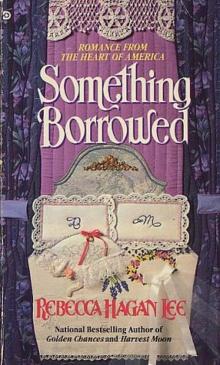 Something Borrowed
Something Borrowed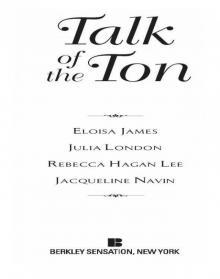 Talk of the Ton
Talk of the Ton Golden Chances
Golden Chances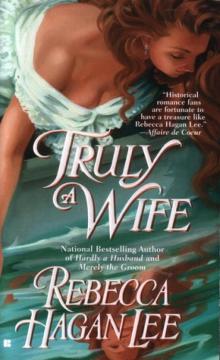 Truly a Wife
Truly a Wife Harvest Moon
Harvest Moon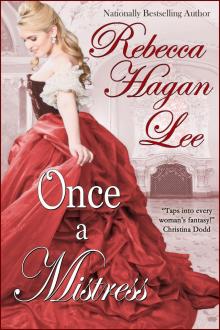 Once a Mistress
Once a Mistress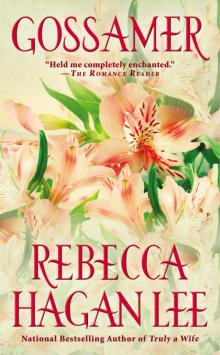 Gossamer
Gossamer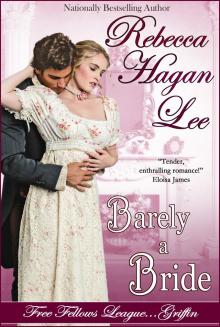 Barely a Bride
Barely a Bride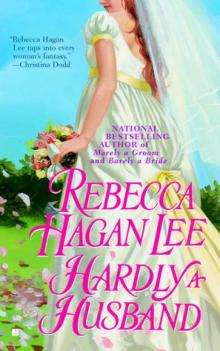 Hardly a Husband
Hardly a Husband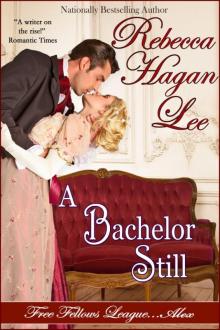 A Bachelor Still
A Bachelor Still A Wanted Man
A Wanted Man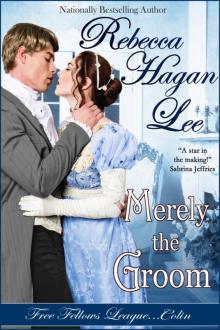 Merely the Groom
Merely the Groom Whisper Always
Whisper Always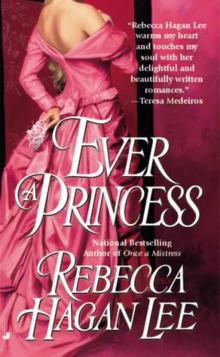 Ever a Princess
Ever a Princess A Hint of Heather
A Hint of Heather